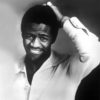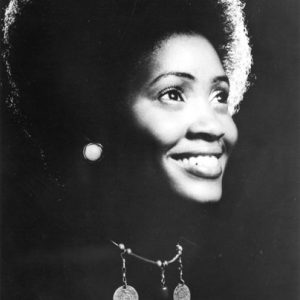calsfoundation@cals.org
Barbara Ann Hendricks (1948–)
Barbara Hendricks is an internationally recognized leading lyric soprano. Whether performing light soprano roles in traditional operatic repertory, demanding premieres of twentieth-century vocal music, song recitals, or jazz, Hendricks has been recognized as a leading artist since the mid-1970s. In addition, she is recognized internationally for her work for human rights and world peace.
Barbara Hendricks was born on November 20, 1948, in Stephens (Ouachita County), the daughter of Malvin Hendricks, a minister in the Colored Methodist Episcopal Church, and Della Mae Hendricks, a teacher. She has three siblings. The family was living in Pine Bluff (Jefferson County), where her mother was teaching, in 1957, and relocated to North Little Rock (Pulaski County) that summer, as her father was preaching at a church there. As she recounted in a 2021 interview with the Arkansas Times, witnessing the violence surrounding the desegregation of Central High School changed her life’s trajectory. Following her father’s preaching career, she lived in Chattanooga and Memphis, Tennessee, before coming back to Little Rock (Pulaski County), where Hendricks graduated from Horace Mann High School, where she sang in a choir led by Art Porter Sr. and was crowned homecoming queen in 1964. She enrolled at Lane College in Jackson, Tennessee, in 1965 and also studied at Nebraska Wesleyan University before transferring to University of Nebraska–Lincoln, where graduated in 1969 with a BS in mathematics and chemistry.
Her musical activities to that point were in church and civic choirs. She was encouraged to attend the Aspen Music Festival and School in the summer of 1969 and there met the celebrated vocalist and teacher Jennie Tourel, who invited her to study at the Juilliard School in New York City after college. She moved to New York, winning several vocal competitions in the early 1970s and completed a degree in voice from Juilliard in 1973.
Hendricks found success with the Mini-Met production of 4 Saints in 3 Acts (1973) and a recording of Porgy and Bess (1974). During the mid-1970s, she performed under the batons of conductors George Solti and Herbert von Karajan. She followed up her initial successes with debuts in San Francisco, California (1974); Paris, France (1982); and London, England (1982), as well as with the Metropolitan Opera in New York City (1987). She has made more than 100 classical studio recordings, including La voiz du ciel (1994), which went double gold.
Hendricks lived in France and then in Switzerland with her husband, Martin Engstrom, a Swedish pianist and opera house director whom she married in 1978 and with whom she had two children; they divorced in the 1990s. She now lives in Norrtälje, Sweden, with her second husband, Ulf Englund, a guitarist and lighting designer, whom she married in 2003.
During the 1970s, Hendricks became more active in politics and protest, especially anti-apartheid movements. Her interest in humanitarian activities led to her being named a goodwill ambassador in 1987 by the United Nations High Commissioner for Refugees; she also guest edited an issue of the French magazine Vogue that same year. In the twenty-first century, she has been particularly involved in efforts to assist refugees, citing her own experience as an African American in Arkansas as the motivation: “For all intents and purposes, I was born a refugee in my own country—born without the same protection under the law that the Constitution afforded every white girl that day.”
Hendricks performed at an inauguration gala for President Bill Clinton’s 1993 inauguration. She received an Honorary Doctor of Music from Juilliard in 2000 and was later inaugurated in into the Arkansas Entertainers Hall of Fame. In 2014, she published her memoir, Lifting My Voice, which features an introduction by Kofi A. Annan, former Secretary-General of the United Nations.
For additional information:
“Barbara Hendricks.” Ebony 45 (May 1990): 158–160.
Barbara Hendricks. http://www.barbarahendricks.com (accessed August 2, 2023).
Forbes, Elizabeth. “Barbara Hendricks.” The New Grove Dictionary of Music and Musicians. New York: Macmillan Publishers, 2002.
Harrison, Eric E. “Barbara Ann Hendricks Englund.” Arkansas Democrat-Gazette, July 20, 2014, pp. 1D, 5D.
Hendricks, Barbara. Lifting My Voice: A Memoir. Chicago: Chicago Review Press, 2014.
Karp, Judith. “Barbara Hendricks.” Fugue 3 (January 1979): 37–38.
Scherer, Barrymore Laurence. “Mimi with a Method: On Becoming Barbara Hendricks.” Opera News 53 (August 1988): 8–12.
Smittle, Stephanie. “The Anti-Diva.” Arkansas Times, July 2021, pp. 22–27. Online at https://arktimes.com/entertainment/2021/07/02/the-adventures-of-barbara-hendricks-lyric-soprano-swedish-citizen-and-refugee-advocate-from-ouachita-county-arkansas (accessed August 2, 2023).
Floyd W. Martin
University of Arkansas at Little Rock
 Arts, Culture, and Entertainment
Arts, Culture, and Entertainment Divergent Prosperity and the Arc of Reform, 1968–2022
Divergent Prosperity and the Arc of Reform, 1968–2022 Music and Musicians
Music and Musicians "Crépuscule," Performed by Barbara Hendricks
"Crépuscule," Performed by Barbara Hendricks  Barbara Hendricks
Barbara Hendricks 




Comments
No comments on this entry yet.